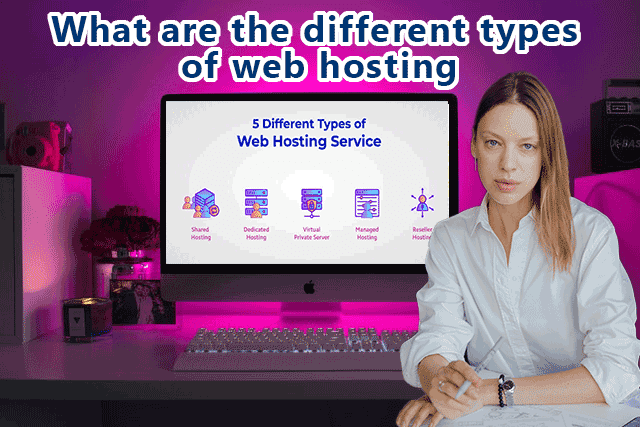What are the different types of web hosting, Web hosting is an indispensable service that you should take into consideration when starting your web page? But what is hosting? What is most appropriate? Why is it important to host the web on a good server?
What is web hosting?
In simple words, it is a service in which the service provider rents out a server connected to the Internet. In this rented space, you can store all the files or data required for your website to function properly.
In turn, the server is a physical computer that runs continuously so that your page is available 24 hours a day, 7 days a week to anyone who wants to see it. Basically, it is a device connected to the Internet through a network with greater bandwidth than usual local connections.
This way, whoever provides the hosting is responsible for keeping the server running uninterrupted. In addition, it must guarantee its security, i.e. protect it from malicious attacks. In particular, to be able to transfer your entire content (text, images, videos, files in general) from the server to your visitors' browsers.
How does web hosting work?
When you create your online portal, the hosting service places all of its files on the server. The web host provides this space for you to store your website on the Internet. Initially, you share network space on the server. Then as your needs increase in terms of internet storage space, you can then choose a separate space on the server for your portal. Your web hosting provider takes care of this storage space for you, ensuring successful access to your website on the Internet.
When users type your domain name on their web browser, their computer connects to the server on which your website is hosted. This server then sends the displayed files to the user on their browser.
There are two basic types of web hosting solutions. One is a free service and the other is a paid service. The free service is free to its end-user and heavily ad-supported. On the other hand, the paid service is more reliable and secure in the long run and offers much more flexibility in terms of storage to deal with heavy online traffic. It is understood that a free hosting solution provider will fulfill the need for your personal blog or non-commercial website.
Types of web hosting
Hosting service providers offer a full range of hosting types in order to respond to their different clients. The most common are:
1. Shared Hosting
It is the most popular web hosting as it is a perfect alternative for small businesses and blogs. In this case, you share a server with multiple clients of your hosting provider. These are those sites hosted on the same server that share all the resources. For example, computing power, disk space, memory, and more aspects.
The good thing about this type of web hosting is that the plans are more economical, and they are ideal for beginners. However, as a related negative point, loading one website can affect another.
2. VPS Hosting (Virtual Private Server)
It is a kind of virtual private server (VPS) where even though the server is still shared with other users, the hosting provider assigns a separate partition for you. It all depends on your own needs. For example, you can get more processor power or memory.
This type of web hosting is ideal for medium-sized businesses that are growing. The main advantage of a VPS is that the performance of your website will not be affected by the increased traffic of other sites you share the server with. However, keep in mind that you will need more technical knowledge to manage the server.
3. Specialized Hosting
Niche web hosting is a special form of shared hosting. But they are created by owners of apps or sites like WordPress, Joomla, Prestashop, and Magento. When you get, for example, specialized WordPress hosting, your server will be configured specifically for that site. So your page will come with plugins pre-installed.
The point in favor of this type of hosting is that thanks to a highly optimized configuration, your website will load faster, and run with fewer hassles. Of course, as a disadvantage, the prices for the plans are higher. Although it is worth the investment.
4. Dedicated Hosting
You will simply have your own physical server dedicated exclusively to your website. So you will have more flexibility, you can configure your server as you want. In addition, you can also choose the software and operating system you want to use. In short, your hosting configuration can perfectly adapt to your needs.
As a negative point, you will need more technical knowledge to configure. The subscription plans are higher than the previous plans.







